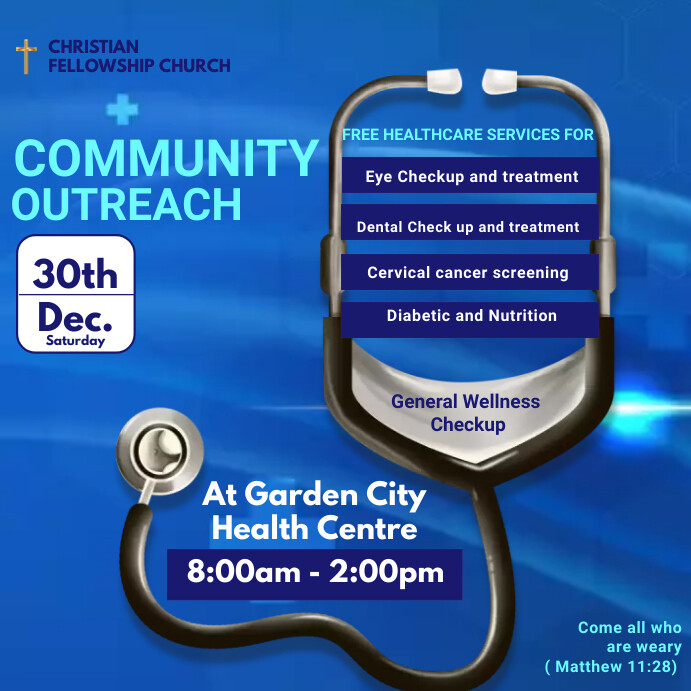The Pillars of Faith-Based Health Outreach:

Religious communities leverage their inherent strengths to support individual and collective well-being. At the core lies:
- Trust and Relationships: Shared beliefs and values foster deep trust, making religious leaders and volunteers trusted sources of information and support. This is especially valuable in reaching marginalized communities where access to healthcare professionals may be limited.
- Strong Social Networks: Close-knit communities offer a sense of belonging and shared responsibility. This inherent support system strengthens preventative health practices and provides essential emotional support during times of illness.
- Cultural Sensitivity and Culturally Competent Care: Religious traditions often offer specific perspectives on health and healing. Faith-based organizations can tailor outreach programs to resonate with cultural beliefs and practices, encouraging greater engagement and understanding.
- Accessibility and Proximity: With community centers, places of worship, and established outreach programs, religious institutions are often easily accessible, particularly for those with transportation or logistical barriers to traditional healthcare settings.
Addressing Multifaceted Health Needs:
The scope of religious health outreach is vast and multifaceted, encompassing:
- Preventive Care and Education: Churches, mosques, synagogues, and temples are increasingly offering health screenings for chronic diseases like diabetes and hypertension, providing crucial early detection and management. Educational programs on healthy living, nutrition, and mental well-being are also gaining traction.
- Mental Health Support: Religious communities offer a safe space for individuals to discuss mental health concerns, often providing counseling or referral services. They can be particularly beneficial for faith-based support groups addressing challenges ranging from grief and loss to substance abuse.
- Maternal and Child Health: Many faith-based organizations actively support expectant mothers and families through pregnancy and early childhood with educational programs, prenatal care access, and even diaper banks and food pantries.
- Disaster Relief and Emergency Response: During natural disasters and emergencies, religious communities often act as the first responders, providing immediate assistance with food, shelter, and medical aid. Their established networks and logistical capabilities make them invaluable in such situations.
- Advocacy and Policy Change: Some faith-based organizations are actively engaged in advocating for health policies that promote equitable access to healthcare and support vulnerable populations.
Challenges and Opportunities:
While the impact of religious health outreach is undeniable, there are also challenges to navigate:
- Balancing Religious Beliefs and Medical Expertise: Engaging patients’ religious beliefs while respecting medical best practices can be delicate. Open communication and collaboration between faith leaders, healthcare professionals, and patients are crucial.
- Funding and Sustainability: Many faith-based health programs operate on limited budgets and rely heavily on volunteer labor. Securing sustainable funding sources is essential for long-term impact.
- Diversity within Religious Communities: Religious communities are not homogenous. It is important to recognize the diverse needs and perspectives within different faith traditions and tailor outreach programs accordingly.
- Secular Ethical Considerations: In some contexts, the intersection of religion and healthcare can raise ethical questions about patient autonomy, end-of-life care, etc. Engaging in open and honest dialogue about these complexities is essential.
Despite these challenges, the future of religious health outreach holds immense promise. Collaboration with healthcare providers, governments, and community organizations can amplify their impact and address even broader health needs.
FAQs:
Can religious organizations provide medical care? Officially practicing medicine requires licensure. Many religious communities offer health screenings and referrals to qualified healthcare professionals but do not provide direct medical treatment.
Is religious health outreach only for members of a particular faith? While many programs are faith-based, many also extend their services to the broader community, regardless of religious affiliation.
How can I get involved in faith-based health outreach? Contact local religious institutions or search online for organizations that align with your interests and values.
What are the benefits of collaborative efforts between religious organizations and healthcare providers? This partnership allows for shared resources, expertise, and outreach, creating a more comprehensive and accessible healthcare system for all.
Conclusion:
Religious communities are increasingly playing a vital role in promoting health and well-being within their communities and beyond. Through their strong social networks, cultural sensitivity, and commitment to service, they are filling vital gaps in traditional healthcare systems. By acknowledging both the strengths and challenges of faith-based health outreach, and by fostering collaborations between religious institutions and healthcare providers, we can harness the power of faith in action to create a healthier future for all.
Closure
Thus, we hope this article has provided valuable insights into Religious community health outreach. We hope you find this article informative and beneficial. See you in our next article!